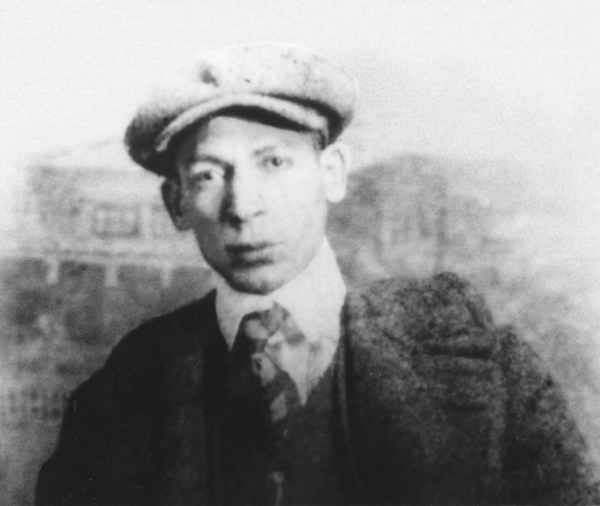Magazine
Jelly Roll’s Blues
The final two songs Morton recorded that day suggest a vanished world of barrelhouse bards.
Published: August 30, 2018
Last Updated: July 26, 2022

Now Morton swung into an old favorite, “Hesitation Blues,” starting with a verse known all over the South: “If the river was whiskey and I was a duck / I’d dive to the bottom and never come up.” His voice was warm and relaxed, and by the seventh verse he almost forgot where he was. “There’s a girl sitting on a stump,” he sang, then caught himself and, rather than singing a rhyming line, filled the space by repeating, “I know, know she’s on the stump.” Between the chorus lines he explained what had happened: “This is the dirtiest verse . . . couldn’t say that.”
The story might have ended there. But Morton was recording for Alan Lomax, twenty-five years old and working for his father as Assistant in Charge at the library’s Archive of American Folk Song. A folklorist with strong left-wing leanings, Lomax had little interest in jazz, which he considered a variety of commercial pop music; his passion was the authentic music of the proletariat, and he urged Morton to go ahead: “Say it!” An unidentified female voice chimed in: “Don’t mind me.” But Morton just laughed and finished with an innocuous couplet: “Tell me babe what you’ve got on your mind / I’m eating and drinking, having a lovely time.”
Morton had been a successful composer and bandleader, and although he was almost fifty and down on his luck, he was hoping the swing era could put him back on top. Lomax, by contrast, was interested in the world of Morton’s youth, the working-class dives of the Gulf Coast and New Orleans’ famed red-light district at the turn of the century. Lomax urged Morton to play the music he’d heard back then, at places like the Flat Top in Biloxi, which Morton had described as “nothing but a old honky-tonk, where nothing but the blues were played . . . The real lowdown blues, honky-tonk blues.”
Blues had swept the United States in the teens, played by bands to accompany the foxtrot, moaned by elegantly costumed singers in theaters throughout the South and Midwest, and featured in the first wave of African-American recordings. Guitarists and pianists played blues on street corners, at picnics, in barbershops, barrelhouses, and urban nightclubs. Some blues were soulful and slow; others were upbeat, naughty numbers like “It’s Tight Like That,” which was played by everyone from Tampa Red and Lead Belly to Benny Goodman and Bob Wills’ Texas Playboys.
That was what most people thought of as “lowdown blues,” but the verse Morton had censored was not a winking double-entendre like the commercial hits. Lomax realized he was getting close to an older, deeper tradition, and after a few more songs he apparently pushed Morton to record the real stuff. Morton at first seems to have resisted: his next blues was a generic naughty lyric leaning hard on the phrase that had caught Lomax’s attention: “Got the lowdown blues, yes, lowdown blues . . . / I got the lowdown blues, too doggone mean to cry.”
Although Lomax kept notes on these sessions, they just flesh out Morton’s story and do not give details of their personal interactions, so we can only speculate about what happened next. My guess is Lomax explained that this was a special situation, that they were preserving history, not making records for public consumption. Maybe Morton agreed it was important to preserve the authentic sounds of the honky-tonks, or maybe he just filed Lomax alongside earlier white customers who had enjoyed hearing dirty songs before they went upstairs with a woman. In any case, his next recording was “Winding Ball” or “Winding Boy” (which Lomax wrote as “Winin’ Boy”), a favorite from his New Orleans days—and this time he didn’t hold anything back:
“I seen that gal, she’s sitting on the stump,” he sang, as before, but instead of excusing himself he provided the rhyming finish: “I screwed her till her p—y stunk.” Then he capped the verse with his trademark tag: “I’m the winding boy, don’t deny my name.”
We could end the story here, and the moral could be that the explicit language and controversial sentiments of gangsta rap are deeply grounded in a blues tradition obscured by decades of censorship. Pops Foster, another fine musician from the New Orleans district, recalled that Morton specialized in this kind of material: “He knew all the dirty songs and that’s where he was great. When a customer would come in the door, Jelly would make up a dirty rhyme on your name and play it to his piano playing.” In other words, Morton was what we now call a freestyler, and his home turf was what is now marketed as the Dirty South.
Except the story is actually more interesting than that, because the final two songs Morton recorded that day suggest a vanished world of barrelhouse bards. The first is a version of a blues standard, “Make Me a Pallet on Your Floor,” but rather than stringing together the usual hodge-podge of verses, it is the dialogue of a pimp in an afternoon tryst with a working man’s wife, tracing the course of their sexual play and the economics underlying it. More than just a song, it is a fifteen-minute musical comedy: graphic, bawdy, and bitingly realistic.
There is nothing faintly like this on other blues recordings, and it was just a warm-up for Morton’s next performance: a murder story in twelve-bar blues form that lasts almost half an hour, during which the heroine kills her cheating lover, is sent to jail, begins a passionate lesbian relationship, and eventually dies, warning other young women not to follow her path.
Jelly Roll Morton died barely three years after these recordings and is remembered as one of the greats of jazz. Alan Lomax went on to a career as one of the defining figures in modern folklore. Neither seems to have been particularly interested in the couple of uncensored blues epics they preserved, and their further recordings in June and December include nothing similar. If Morton had not slipped and revealed his self-censorship or if Lomax had been a less broadminded interviewer, these songs would not have been recorded and we would not know they—or anything like them—existed. They are tantalizing glimpses of a vanished epic tradition, exploring the intricacies and intimacies of African-American working-class life in the viewpoint and language of that world.
Elijah Wald is a musician and writer whose dozen books include Escaping the Delta: Robert Johnson and the Invention of the Blues and How the Beatles Destroyed Rock ’n’ Roll: An Alternative History of American Popular Music. He is slowly researching a series of books on early blues and the deep roots of rap.
